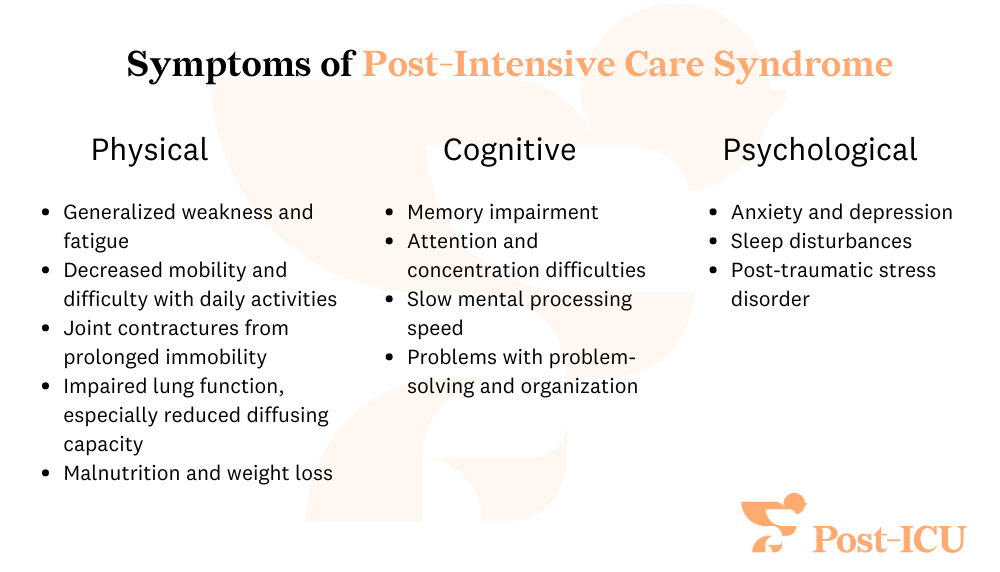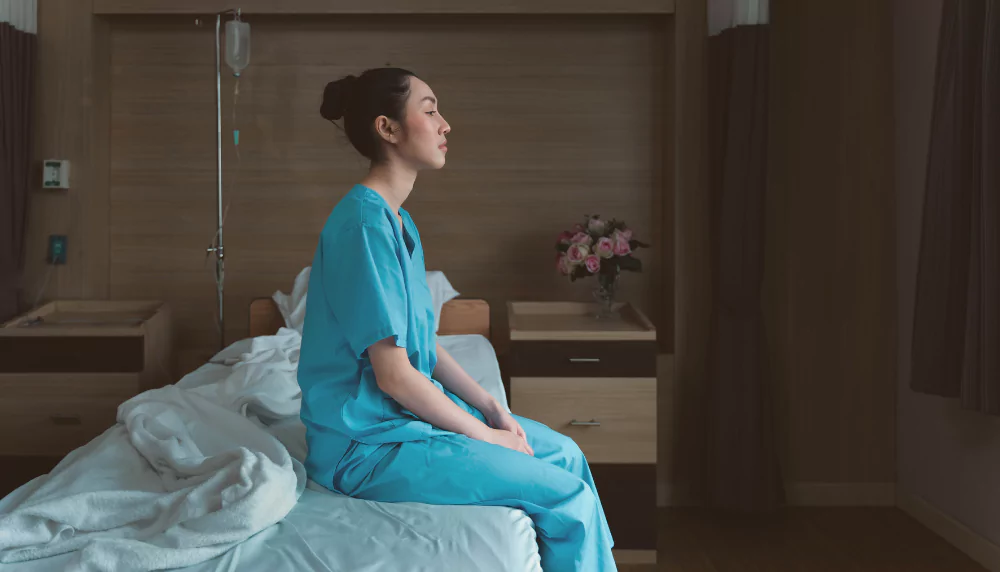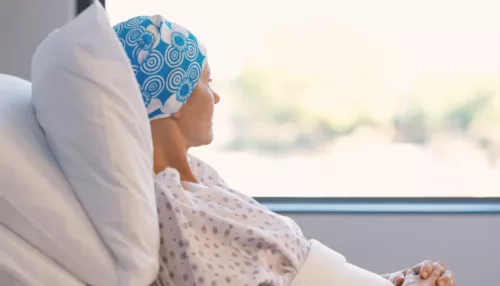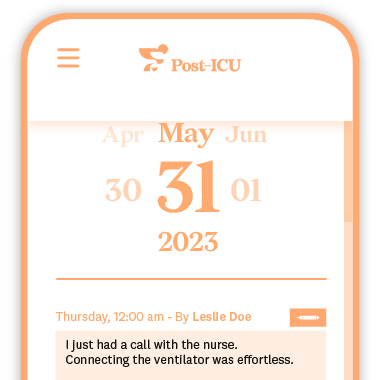Post-Intensive Care Syndrome (PICS) is a condition reflected by various physical, psychological and cognitive symptoms experienced by patients after ICU stay and discharge.
Research shows 50% to 75% of survivors experience some form of PICS1Burdick, K., & Callahan, C. (2020). Sleeping Soundlessly in the Intensive Care Unit. Multimodal Technol. Interact., 4, 6.2Abbas, A., Zayed, N., & Lutfy, S. (2019). Post ICU syndrome among survivors from respiratory critical illness. A prospective study. Egyptian Journal of Bronchology, 13, 505-509.3Wang, S., Hanneman, P., Xu, C., Gao, S., Allen, D., Golovyan, D., Kheir, Y., Fowler, N., Austrom, M., Khan, S., Boustani, M., & Khan, B. (2019). Critical Care Recovery Center: a model of agile implementation in intensive care unit (ICU) survivors. International Psychogeriatrics, 32, 1409 – 1418. .

Both financial and human costs of PICS are substantial: higher readmission rates, the necessity of long-term family support, inability to return to work, ongoing healthcare utilization, etc. are just some of the burdens carried by survivors, their families, and hospitals. This is why further research into effective strategies to mitigate PICS is crucial for better patient outcomes and quality of life. Let’s look at the currently available validated strategies including a tool – ICU diary – that can help alleviate or prevent symptoms of PICS.
Early Mobilization and Physical Therapy
Getting the patient moving as soon as possible can prevent ICU-acquired weakness and improve physical function. This includes engaging patients in recommended treatments, involving physical and occupational therapists, introducing ergometer training and neuromuscular stimulation, etc.4Liu, K., Tronstad, O., Flaws, D., Churchill, L., Jones, A. Y., Nakamura, K., & Fraser, J. F. (2024). From bedside to recovery: exercise therapy for prevention of post-intensive care syndrome. Journal of Intensive Care, 12(1), 11.5Renner, C., Jeitziner, M. M., Albert, M., Brinkmann, S., Diserens, K., Dzialowski, I., … & Nydahl, P. (2023). Guideline on multimodal rehabilitation for patients with post-intensive care syndrome. Critical Care, 27(1), 301.
Delirium Prevention
Preserving cognitive health as much as possible is essential for mitigating PICS. The most significant risk factor for cognitive impairment with PICS is delirium, especially a longer duration of delirium in the ICU. Reducing delirium and cognitive impairments can be done through controlling sedation, promoting sleep-wake cycles, providing sensory stimulation, attention training, etc.6Rawal, G., Yadav, S., & Kumar, R. (2017). Post-intensive care syndrome: an overview. Journal of translational internal medicine, 5(2), 90-92.7Mulkey, M. A., Beacham, P., McCormick, M. A., Everhart, D. E., & Khan, B. (2022). Minimizing post–intensive care syndrome to improve outcomes for intensive care unit survivors. Critical care nurse, 42(4), 68.8https://www.icudelirium.org/patients-and-families/pics
Family Support
Involving families in patient care has been shown to alleviate the psychological impact of critical illness both on patients and families (PICS-F). Families can be involved through protocolized family support interventions and tools such as ICU diaries. Additionally, follow-up care often involves families along with multidisciplinary teams which ensures continuity of care and contributes to better recovery. The encouragement and support of families is especially important for other interventions as well, such as mobilization or therapy.9Rawal, G., Yadav, S., & Kumar, R. (2017). Post-intensive care syndrome: an overview. Journal of translational internal medicine, 5(2), 90-92.10Mulkey, M. A., Beacham, P., McCormick, M. A., Everhart, D. E., & Khan, B. (2022). Minimizing post–intensive care syndrome to improve outcomes for intensive care unit survivors. Critical care nurse, 42(4), 68.11Hwang, D. Y. (2020). Mitigating postintensive care syndrome among patients and caregivers via a dyadic intervention. JAMA Network Open, 3(10), e2021014-e2021014.
Psychological Support
ICU survivors can benefit from follow-up counseling with a psychologist or psychiatrist after discharge. Depression, anxiety, and PTSD can be treated with medications and therapy.
Therapies like cognitive processing therapy and narrative therapy can help ICU survivors process their traumatic experiences and develop coping strategies for PTSD, anxiety, and depression associated with PICS.12Smith, S., & Rahman, O. (2020). Post intensive care syndrome.
ICU Liberation Bundle
Many of this interventions are a part of the ICU liberation bundle, or the ABCDEF bundle.
Learn more about it here.
ICU Diaries: Proven Tool for Preventing and Reducing PICS Symptoms
PICS is a complex condition that requires a multidisciplinary approach with regular assessment of physical, cognitive, and psychological health.13Rawal, G., Yadav, S., & Kumar, R. (2017). Post-intensive care syndrome: an overview. Journal of translational internal medicine, 5(2), 90-92.Early intervention and long-term access to recovery centers have been shown to benefit ICU survivors. Another low-risk, validated PICS intervention is an ICU diary.
Maintaining an ICU diary kept by family members, healthcare providers, or both has been shown to decrease symptoms of PICS in ICU survivors. The diary helps patients reconstruct their ICU experience and provides a narrative to process the trauma. Additionally, it involves the family in the care of the patient, reducing the feeling of powerlessness and alleviating PICS-F as well. Through family engagement, relationships between healthcare providers and families/patients are built, and these stronger connections contribute to better communication and collaboration. All of this improves patient outcomes and sets them up for success after the ICU.
The Post-ICU Digital Diary is a digital, privacy-preserving, easy-to-use tool that helps engage families in recovery, create a shared narrative of what happened, and allow families and patients to cope with and process the trauma of an ICU stay through journaling. Contact our team to get more information about introducing Post-ICU Diary into your hospital.





